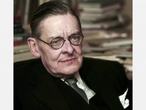Biography

Thomas Stearns "T. S." Eliot OM (September 26, 1888 – January 4, 1965) was a playwright, literary critic, and arguably the most important English-language poet of the 20th century. Although he was born an American he moved to the United Kingdom in 1914 (at age 25) and was naturalised as a British subject in 1927 at age 39. The poem that made his name, The Love Song of J. Alfred Prufrock - started in 1910 and published in Chicago in 1915—is regarded as a masterpiece of the modernist movement. He followed this with what have become some of the best-known poems in the English language, including Gerontion (1920), The Waste Land (1922), The Hollow Men (1925), Ash Wednesday (1930), and Four Quartets (1945). He is also known for his seven plays, particularly Murder in the Cathedral (1935). He was awarded the Nobel Prize in Literature in 1948.
Born in St. Louis, Missouri, Eliot went east for college and was educated at Harvard. After graduation, he studied philosophy at the Sorbonne for a year, and then won a scholarship to Oxford in 1914. An expatriate, he became a British citizen at the age of 39. "[M]y poetry has obviously more in common with my distinguished contemporaries in America than with anything written in my generation in England," he said of his nationality and its role in his work. "It wouldn't be what it is, and I imagine it wouldn't be so good ... if I'd been born in England, and it wouldn't be what it is if I'd stayed in America. It's a combination of things. But in its sources, in its emotional springs, it comes from America." Eliot renounced his citizenship to the United States and said: "My mind may be American but my heart is British."
For a poet of his stature, Eliot produced a relatively small amount of poetry and he was aware of this early in his career. He wrote to J. H. Woods, one of his former Harvard professors, "My reputation in London is built upon one small volume of verse, and is kept up by printing two or three more poems in a year. The only thing that matters is that these should be perfect in their kind, so that each should be an event."
Typically, Eliot first published his poems individually in periodicals or in small books or pamphlets, and then collected them in books. His first collection was Prufrock and Other Observations (1917). In 1920, he published more poems in Ara Vos Prec (London) and Poems: 1920 (New York). These had the same poems (in a different order) except that "Ode" in the British edition was replaced with "Hysteria" in the American edition. In 1925, he collected The Waste Land and the poems in Prufrock and Poems into one volume and added The Hollow Men to form Poems: 1909–1925. From then on, he updated this work as Collected Poems. Exceptions are Old Possum's Book of Practical Cats (1939), a collection of light verse; Poems Written in Early Youth, posthumously published in 1967 and consisting mainly of poems published 1907–1910 in The Harvard Advocate and Inventions of the March Hare: Poems 1909–1917, material Eliot never intended to have published, which appeared posthumously in 1997.
* Prufrock and Other Observations (1917)
o The Love Song of J. Alfred Prufrock
o Portrait of a Lady (poem)
o Aunt Helen
* Poems (1920)
o Gerontion
o Sweeney Among the Nightingales
o "The Hippopotamus"
o "Whispers of Immortality"
o "Mr. Eliot's Sunday Morning Service"
o "A Cooking Egg"
* The Waste Land (1922)
* The Hollow Men (1925)
* Ariel Poems (1927–1954)
o The Journey of the Magi (1927)
* Ash Wednesday (1930)
* Coriolan (1931)
* Old Possum's Book of Practical Cats (1939)
* The Marching Song of the Pollicle Dogs and Billy M'Caw: The Remarkable Parrot (1939) in The Queen's Book of the Red Cross
* Four Quartets (1945)



